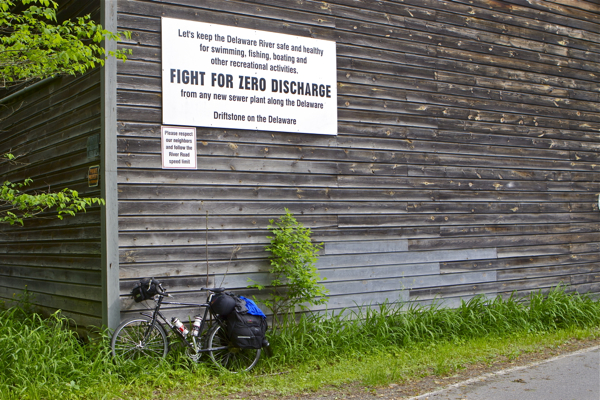| Two notes of the chord, that’s our poor scope, And to reach the chord is our life’s hope. And to name the chord is important to some, So they give it a word, and the word is OM. |
~~~ “The Word” – and “OM” – Moody Blues In Search of the Lost Chord (1968)

"Fight for Zero Discharge" - and bicycles! (Delaware River, Pa. side)
[Update – 11/8/11: Tennessee pipeline goes on line – just in time for DRBC approval of gas supply. It will take decades to restore the damage. Bergen Record: Portly pipeline does on line
Ah yes…., but most of us spend most of our time in the material world (h/t George Harrison).
So, in this material world, to defend the chord is  important to some, and they give it a word, and the word is OM – as in Occupy Marcellus!
Marcellus, as in the shale gas bearing region. The Marcellus Shale covers areas in Kentucky, Maryland, New York, Ohio, Pennsylvania, Tennessee, Virginia, and West Virginia.
The forests, farms, rivers, and streams of that entire 8 state region are under threat from fracking well drilling.
There is a critical event happening on November 21, when the Delaware River Basin Commission will vote on regulations that would lift the current moratorium in the Delaware watershed, and thus open the floodgates to 20,000 fracking gas wells!
It  is important that organizing for turnout and protest at that hearing be the primary focus right now (see this call to action and see the for mobilization info on the November 21 DRBC protest).
But I’d also like to plant the seed for discussing next steps – as I anticipate that DRBC will vote to approve the regulations and promote fracking in the watershed.
When that occurs, it will illustrate a total breakdown in democratic governance, as the voices and views of thousands of people in the region will have been ignored in favor of the oil and gas lobby.
DRBC approval is sure to generate a huge and angry  backlash.
In response, mainstream citizens working to stop fracking – those who still have faith in our institutions and democratic processes – could either become radicalized and more active, or disgusted and apathetic.
More experienced activists, who already understand  how  powerful special interests control and pervert our democracy, might go down non-productive paths (violence, anarchy, apathy), or pursue collective direct action.
So, with this critical fork in the road just ahead, it is important to organize and channel that backlash into effective action  – including direct action, civil disobedience, and more traditional forms of political protest and political accountability.
In concert with an Occupy Marcellus type of Movement, a more traditional organizing strategy and set of policy demands can be developed and gain visibility and political influence by Occupy direct action tactics.
There are immediate ongoing threats happening on the ground at thousands of fracking wells now operating across the region.
But there also are intermediate and long term threats associated with the huge planned expansion of the fracking industry that must be addressed.
These include secondary impacts that would result from the enormous growth projected for the fracking industry.
What I anticipate will be loss at DRBC can become the catalyzing moment to unify and organize hundreds of organizations and millions of activists who now oppose fracking in their communities.
Who will seize the moment?
[Update: 11/11/11: Naomi Klein explains the sources of the problems here:
Half of the problem is that progressives—their hands full with soaring unemployment and multiple wars—tend to assume that the big green groups have the climate issue covered. The other half is that many of those big green groups have avoided, with phobic precision, any serious debate on the blindingly obvious roots of the climate crisis: globalization, deregulation and contemporary capitalism’s quest for perpetual growth (the same forces that are responsible for the destruction of the rest of the economy). The result is that those taking on the failures of capitalism and those fighting for climate action remain two solitudes, with the small but valiant climate justice movement—drawing the connections between racism, inequality and environmental vulnerability—stringing up a few swaying bridges between them.

Pingback: WolfeNotes.com » Fracking Oversight